#katara meta
Text
I know people have already talked about this topic, but I want to too.

There are a lot of jokes on the Internet about how Katara constantly mentions her mother as if it were the most important event, but...
Isn't that so? I mean, in the life of a little eight-year-old girl, this is truly the most important event in her life and she wants to share it.
Katara took on the role of an adult too early, and she didn't have the opportunity to work through this problem with anyone, because she's already an adult => she cannot afford to rely on someone. But she needs it, and that's what traveling with Aang gives her: the opportunity to find children like her and share with them the burden that she has been carrying all this time. Note that Haru, Jet, and even Zuko are people who not only have experienced loss, but also have some kind of responsibility for others: for their family or even for a group of people. She doesn't tell adults about this because she isn't looking for care, she's looking for understanding of her feelings.
The problem is that it's not enough for her. Her sadness turns to rage because the further the story goes, the less satisfied Katara becomes.
The closer the heroes get to the end of the war, the more angry Katara gets: first at her father, then more specifically at Zuko. And, in the end, she finds the cause of this anger, as well as the opportunity to satisfy the thirst for understanding of her grief - the murderer of her mother. She needed revenge not just because it was fair, but because from the very beginning of the series, Katara was looking for an opportunity to calm those feelings that were rushing out. And her attempts to do this by expressing the problem were not enough. She needed more, and she got it by facing the biggest monster in her life.
In general, the “monster” metaphor obviously speaks not only about Yon Ra, but also about Katara herself. Or rather about her anger. Judge for yourself: she had to restrain a storm of emotions from the age of eight; she began to reveal her grief only in the first season, that is, at the age of 14. She ignored her pain, pushing it deep inside until it became a raging monster rushing out. And what Katara really needed was to face it. So when she flies to find Yon Ra, she also finally meets the version of herself that she has carefully ignored and hidden for the benefit of others.
It's funny that Zuko is the one who helps her. In general, it was his complete understanding of Katara in this matter that amazed me. He, like no one else, knows what it’s like to face your inner demons and knows how useful it is for knowing yourself. And how dangerous it is when you're alone in it. So he accompanies her to keep her safe. So that she has a person on her side who will be there, no matter what choice she makes. He will support anyone. (I'm crying because of how beautiful it is wasgffv💖)
(A small antikataang insert: this is the reason why their relationship doesn't work. Aang only supports the right decisions, even if they require Katara to sacrifice inner harmony, while Zuko will simply support her for whatever choice she makes. It's funny because Aang has to keep balance and as a monk he knows a lot about that. The show focuses heavily on the theme of yin and yang, that is, the balance of good and evil. In order to achieve internal balance, Katara needed to turn to internal evil, because she tilted this scale towards good. She was imbalanced to begin with, and instead of understanding this, Aang insisted on continuing the preponderance of good. It’s as if he doesn’t understand that the preponderance of good is as bad as the preponderance of evil, and this will only harm Katara. I hope my point is clear)
Finally, Katara finds inner peace when she faced everything that was raging inside her, when she did what she needed and poured out everything she ever wanted. Every word about her mother led us to this moment, as did Katara herself.
And do you know what the point is? Why am I telling all this? It's all a character arc that unfolds linearly over three seasons.
Now think back to the arc of Aang, the main character of the show, in relation to his family. Did he bring them up in seasons two and three in a way that was linear? I mean, the one who constantly grieves over his father's death should have been Aang, because he learned the pain of loss so recently, he didn't have a chance to get used to it. But even in the episode SR, Aang compares the loss of mother not to the loss of his mentor and father, but to the loss of Appa and his people. It’s as if he doesn’t care about the individual connection with Gyatso and it’s nominal.
Katara, on the other hand, has emotions that she smoothly carries throughout the show and resolves in it. She has a huge number of Chekhov's guns, which each fire at its own time. Her feelings about her mother, the development of these emotions and their resolution are the most beautiful thing about this show along with Zuko's arc (even though I have problems with him in book 3).
And making derogatory jokes about it like Katara is whining and annoying is blasphemy. After all, she's the only one of the Gaang who has a single development arc throughout all three seasons, this must be respected
#atla#atla critical#avatar the last airbender#atla meta#anti kataang#anti aang#katara#zuko#zutara#katara supremacy#katara is the real main character change my mind#katara deserved better#katara meta#southern raiders
342 notes
·
View notes
Text
i've written before about how fire lady katara isn't an inherently disempowering or racist trope, as have many others, but lately i've been thinking about how arguments against fire lady katara often tend to utilise a surface-level interpretation of colonial trauma.
[edit: this post will use the term "colonial trauma" because those who argue against fire lady katara usually use the same wording or are referring to that concept. but it's important to note that according to show canon, the fire nation did not colonize the southern water tribe and zuko and katara did not have a colonizer/colonized relationship.]
antis who present this argument usually posit that marrying zuko would be a form of re-traumatization for katara, while marrying aang would "protect" her. katara is supposedly more shielded from confronting the impact of colonization in the southern water tribe or on air temple island than she would be with zuko in the fire nation, which contextualizes colonial trauma purely through the lens of physical interaction with the colonial power (ie. living in the fire nation or looking after the people of the fire nation). whether intended or not, this argument inadvertently limits colonial trauma to the geographical boundaries of the colonizing country and implies that it can be reduced or averted solely by minimizing contact with said country.
even leaving aside that we have seen katara in the fire nation (and enjoying herself there), the implication here is that active engagement with a colonial power as a member of colonized peoples is an inherent form of re-traumatization... which i take issue with for multiple reasons.
firstly, katara lives in a world that has been permanently shaped and changed by imperialism, and that's going to affect her no matter where she goes. sequestering herself in the south pole her whole life and never seeing a glimpse of fire nation red again won't allow katara to escape the legacy of colonization or the trauma it has caused her, because its influence is rooted in everything from her family to her tribe to her own bending. believe me, i understand the appeal of a world where women of colour can avoid reckoning with the impact of colonization by simply never setting foot in the colonizing country again, and why people might be uncomfortable with zutara individually as a result - but i can't accept it as a valid argument against the ship, because that's just not how colonial trauma works.
secondly, the idea that this "protects" katara reeks of paternalism because katara is not a character who chooses her path simply based on how safe or comfortable it is. if that was the case, she would never have left the southern water tribe at all! she could've remained there her whole life and likely been safe, since the fire nation had no real interest in the south pole any longer. katara is fundamentally defined by how relentlessly revolutionary she is - over and over, she chooses to do what is right, what is hard, what is unexpected, even at cost to herself. she challenges injustice and discrimination and bigotry; she fights for the downtrodden and speaks for those who can't speak for themselves; she will never ever turn her back on the people who need her. does that truly sound like someone who needs to be hid away and protected from her own supposed re-traumatization?
thirdly - and i fully accept that there are those who might disagree with this - katara actively choosing to engage with her colonial trauma can be empowering just as it can be traumatizing. don't get me wrong: as a woc and a minority in my own country, i understand how tiring it is to do this. i understand the exhaustion of confronting what was done to you and your people, of facing down bigotry over and over. i understand the desire to run away from it all, and why it can be wish fulfilment for others to let katara do so. i really, really do.
but there is also wish fulfilment in letting katara fight, as a brown girl with power and resources that few brown girls in the real world hold. there is a power fantasy in seeing katara head into the belly of the beast and emerging triumphant. there is empowerment to be found in seeing katara struggle with racism and ignorance and mindless hate to enact change - and succeed. i love reading and writing about katara unpacking her trauma regarding the fire nation, about growing to love the place she once hated, about reconciling both her homes and healing from the wounds of her childhood.
and ultimately, i think that's what katara would want for herself. after throwing herself head first into the fight against the fire nation, after facing down her greatest trauma instead of letting it consume her, after helping and protecting the people of the fire nation, after refusing to let the fire nation take anything else from her - i firmly believe that the last thing katara would do is allow herself to be ruled by the fire nation instead of being the one ruling it.
personally, i find that a more hopeful and victorious narrative than one where she remains safe and sheltered away from the fire nation, but forever haunted and dictated by her trauma. would that be realistic? perhaps. but the entire point of foiling katara with characters like jet and hama is to show that she's not doomed to be mired in the pain of her past. that where their stories could only end in tragedy, hers can - and does - end in hope for something better, as she always believed it could.
228 notes
·
View notes
Text

I usually try to write neutral captions for my ATLA drawings, but this time I want to share my disappointment with this cartoon.
At first it was supposed to be a slight redesign of Katara from book 3. I don't really like her blue dress from there, and I tried to draw certain elements differently to understand what exactly bothered me. I like the result, especially her sleeves and the fabric on her arms. I also wanted to draw a crescent moon on her forehead because book 3 forgot that the Water Tribe paints their faces before battle. I wanted to give Katara something related to her personal experience, so imho she would have a crescent moon on her forehead in the invasion.
And then I started thinking about her hair (I ended up using the hairstyle from this post). It always confused me that in the first episode of season 3 Katara had her signature braid, because she lost her clips at the end of season 2. Where did the new ones come from? Does she have a whole set of spare ones? Or did father give it to her? I don’t understand, so I think that her hairstyle in book 3 could be completely different from the look we are used to.
Then I asked myself: what would she look like in the first episode if her hairstyle had been changed? You can see the answer for yourself. Frayed curls, an almost untied bun, a tired look… This is how I felt about Katara at the beginning of the season and… I was furious.
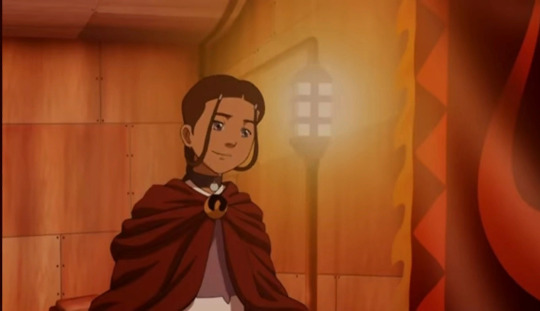
Why doesn't she look like this? Why wasn't she allowed to show her fatigue? Yes, her clothes are still torn and unkempt, but neither her face nor her hair reflect her condition, why? Were the authors afraid to show that Katara also has limits?
Girls are not required to look beautiful and well-groomed, especially when they are tired. It makes me so angry that after her witnessing the death of a dear friend, escaping on a ship, caring for a sick boy for a long time, and then his screaming and running away, Katara looks the same as always. She is not tired, she is still ready to support the main character and run to the ends of the earth for him.
?!??!
But ok, maybe this is just the beginning, and we'll be shown reaching Katara's limits in the next episo-
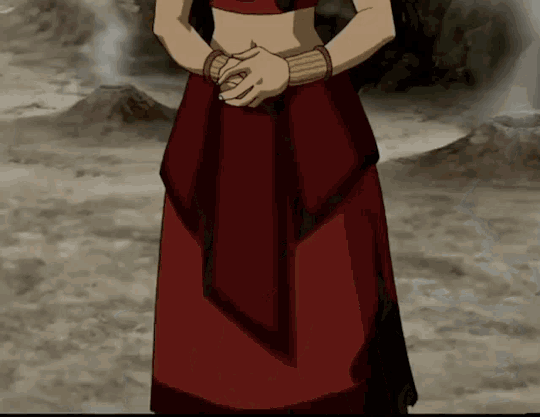
…
Oh, she is now completely neat and well-groomed so that the boy can admire her beauty…
It doesn't sound very good, to be honest. I don’t want to insult the ship or the main character, we’re not talking about them now. I'm talking about the very message where the girl is beautiful and mentally stable when it is convenient for the boy. That is, imagine if Katara looked at that moment about the same as in my drawing. Would he like her in this state? I don't know, because I haven't seen Aang admire Katara beyond the peak of her beauty. Also, I didn’t see him admiring her with disheveled hair, for example, or in action scenes. It’s not that it’s the characters’ fault, but rather that the authors rarely allow Katara herself to be like this, especially at the end of the adventure, where she clearly has little moral strength.
Feels like the message is that in a man's eyes, a woman is only beautiful when she dresses up and hides her flaws. As if fatigue is something that needs to be hidden behind a sweet smile and a beautiful outfit.
Maybe I'm not right. Please don't take my words as an insult to something you enjoy, but that is my interpretation of what is happening. This is a problem for me, because the topic of female fatigue in my eyes is as important as female strength. And if the series shows Katara's strength, it seems to ignore her fatigue.
This is just an opinion, I don't claim anything.
#atla#avatar: the last airbender#atla fanart#atla critical#katara#atla katara#katara meta#katara's fatigue#I only remember two episodes dedicated to Katara's fatigue and her moral boundaries#This is “The Desert” and “The Southern Raiders”#A man needs his rest#and Katara is no exception
499 notes
·
View notes
Text
A collection of seyaryminamoto's ATLA takes
For those who are not aware, @seyaryminamoto is someone who has been in the Azula fandom a very long time and who has written many brilliant metas that have greatly influenced my understanding of Azula, Zuko, and other characters. Thus, I decided to put together a post with links to all of her metas that I could find:
On the flaws in Zuko's redemption arc.
More on flaws in Zuko's arc.
On the four most overrated characters in ATLA
Yet more on flaws in Zuko's arc and why fans overrate and misunderstand his character.
Why Zuko's arc didn't revolve around him learning compassion
On reoccurring sibling conflicts in ATLA and LoK and Su and Lin
On the lack of accountability in modern story-telling and Zuko
On certain patterns of evil younger siblings in LoK and ATLA
On the Smoke and Shadow and Azula
On Gene Yang not understanding Azula
More on Azula
More on flaws in Zuko's redemption
On Azula, Iroh, and Zuko being held to different standards
On why the Fire Nation accepting Zuko as ruler makes no sense
On sexism in the Fire Nation
On whether Zuko or Aang is more moral
On how the ATLA finale could have been changed to give Azula a better fate.
On why Azula's breakdown was rushed, writing wise.
On why Iroh is sexist.
Edits:
On whether Zuko understands the concept of "Duty"
On Lo and Li and Azula
On Zuko, the Fire Teens, and "The Beach"
On Zuko, the Southern Raiders, and Justice
On Zuko and his "life-changing field trips"
On Zuko and what his arc could have been
On the issues with Katara's and her "arc"
108 notes
·
View notes
Text
Katara is More Patient Then We Give Her Credit for
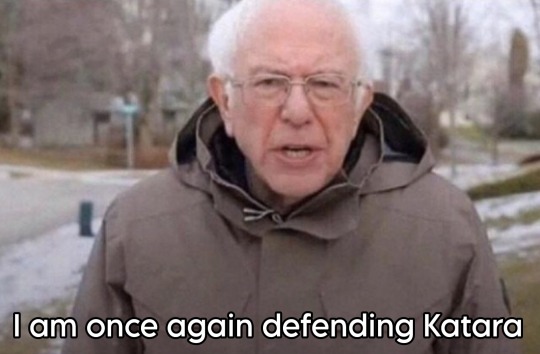
Katara has been getting a lot of flak for supposedly being hot headed and getting angry at very minor things. Even those who love Katara seem to accept this as the truth. But it's not. In reality, Katara is simply a female character who owns her rage. And I feel like there are two main components that debunk this notion.
Warning: Long, long post.
1. In the instances where Katara is angry it's either justified or makes sense in context.
The Waterbending Scroll
Katara stole, wouldn't you know it, a waterbending scroll. She practices before giving it to Aang, and fails hard. Then Aang who she's supposed to be teaching, gets it right and explains how to do it. Katara has an outburst.
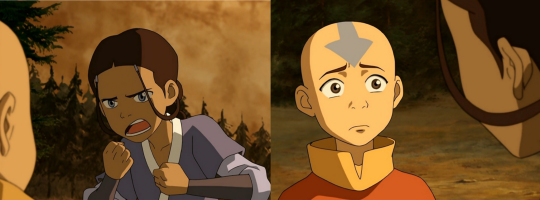
Katara: Will you please shut your air-hole! Believe it or not your infunite wisdom gets a little old sometimes. Why don't we just throw the scroll away since you're so naturally gifted!
Why is Katara that mad here? Why did she have an outburst? Because she was carrying the burden of being the last waterbender of the Southern Water Tribe her whole life. Because her waterbending is the reason Kya died. Because she have been independently studying waterbending her whole life. And now her student is having it all easy and is trying to teach her.
And wouldn't you know it, she realized what she did immediatly. Literally, a second later.
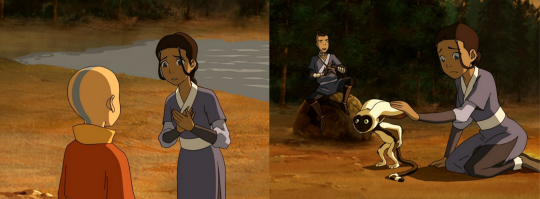
Katara: Oh my gosh Aang. I am so sorry. I don't know what came over me. But you know what, it won't happen again. Here [the scroll] is yours. I don't wanna have anything to do with it anymore.
She even apologized to Momo. Katara had an isecurity rooted in trauma and pressure. When Aang try to teach her she hit a breaking point and lashed out. And not one second later she's already apologizing.
The Waterbending Master
Katara and Aang are going to see Pakku, the waterbending master. But when Pakku sees she's a girl, he says he won't teach her. This is why Katara gets angry. She flew across seas just to get rejected due Pakku is being a sexist freak. I think we can all agree that being denied something because of sexism is a good reason to get angry. And when Katara realized Pakku won't teach Aang if she'll keep insisting, she drops it abd tells Aang to drop it too.
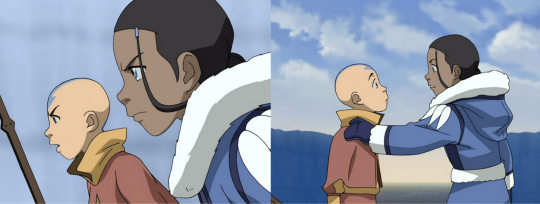
However, that doesn't mean she won't study in secret. She deserved to learn waterbending and she knew it. She took the consequences into consideration and decided to not make a fuss.
But of course, they both get caught. Pakku says he will no longer teach Aang, the Avatar who absolutly needs to study and still refuses to teach Katara because he's still sexist. Only then Katara challenges him to a duel. Only when they have nothing to lose. She challenged a sexist prick to a duel, one who shamelessly denied her oppretunity because of her gender.
The Chase
At the start of the episode Katara gently hints Toph to help unpack a camp for the night. This is when she's not tired yet, and shows patience.
Katara: So Toph, usually when setting up camp, we try to divide up the work.
Toph: Hey, don't worry about me. I'm good to go.
Katara (still calmly): Well, actually, what I'm trying to say is, some of us might fetch water while someone else might set up the fire pit or put up the tent. *smiles* Even Momo does his fair share.
Toph (slightly irritated): Katara, I'm fine. I can carry my own weight. I don't need a fire. I've already collected my own food. And look. *earth bends a tent* My tent's all set up.
Katara: Well, that's great for you but we still need to finish-
Toph (loudly): I don't understand. What's the problem here??
Katara: Never mind.
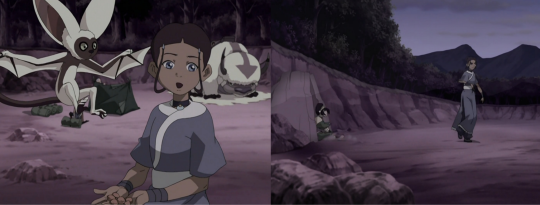
Katara then goes to apologize. While also attempting to make sure her and Toph are on good terms by having her acknoledge that she wasn't 100 absolutly in the right.
Katara: Hey Toph, I wanted to apologize for earlier. I think we're all just a little tired and getting on each other's nerves.
Toph: Yeah, you do seem pretty tired.
Katara (slightly irrutated): I meant all of us.
Toph: Well, good night.
Katara: Good night.
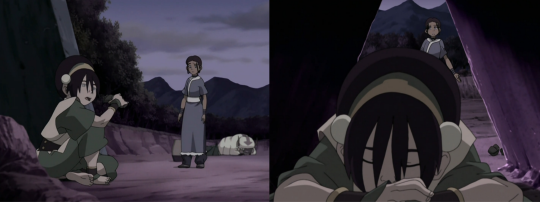
By all means, Toph is in the wrong for the sheer refusal for communication. At first Katara calmly explained to her what was needed without even spelling it out. Toph was being passive, so she dropped it. And then she apologizes after doing nothing wrong just so they could be on good terms. Toph was the one being passive agressive. And Katara pretty much let it slide.
This is Katara. The patience she showed right here is her natural, normal self. The rest of the episode is under the context of sleep deprivation and how it's making them all hostile to each other. Including the pacifist Aang. Who's outburst leads Toph to leave. After she does, both Aang and Katara express remorse.
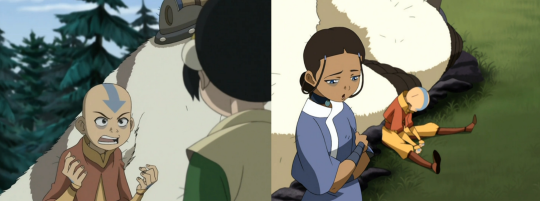
(Side note: I heard people take issue with the line "The stars sure are beautiful tonight, too bad you can't see them, Toph". It's been interpreted as Katara making fun of Toph for being blind, but it's just another instance in the recurring joke of the Gaang forgetting Toph is blind, and listed as such in the official A:TLA Youtube channel).
The Runaway
Update: This section, especially, is majorly outdated.
The episode has a silly opening where Aang is trained by Toph and Katara. Toph misses and accidently hits Katara with a big rock. After Toph doesn't apologize, it leads into a fight which is absolutly not to be taken seriously, that ends with Aang pointing out that it was supposed to be training.
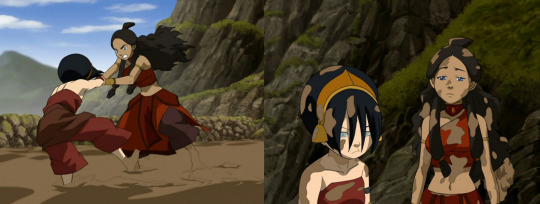
It doesn't work as an exapmle for supposed hot-headedness because the reason this whole thing started because Toph hit Katara with a rock and refused to apologize.
But moving on to the real conflict of these episode, Toph scammed someone and Katara makes it clear that they shouldn't do it again, it'll draw attention to them. Aang promises her it won't happen again but.. um.. you know what happened.
Katara, being responsible, told them to quit because they'd potentially get exposed. Toph didn't reach well, telling her to lighten up. Katara rightfully gets angry, because they really might get exposed and Toph is dismissing her like her concerns are nothing. They have a short argument and Toph storms out.
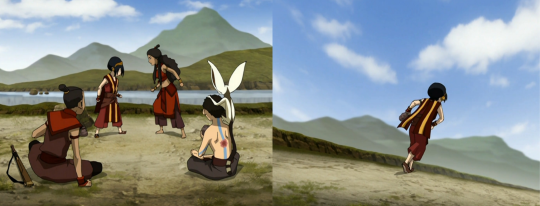
This is why Katara was angry this episode. Her reasoning for being upset is the Gaang potentially exposing themselves for easy money. That's the conflict.
The Painted Lady
In this episode Katara sees a starving Fire Nation village but Sokka won't allow them to stay due to time limits. So she faked a disease for Appa so they could. Sokka confronts her. At first, she gives up and packs to leave. But since she destroyed the factory that's been polluting the villages water and taking their medicine, the people in charge assumed it was the civilians, and were coming to attack. Sokka and Katara get into a small but intense argument. Important to note, that she doesn't react intensively until Sokka does.
Katara: Well, what was I supposed to do?
Sokka: Leave! Do nothing.
Katara: No! I will never, ever turn my back on people who need me.
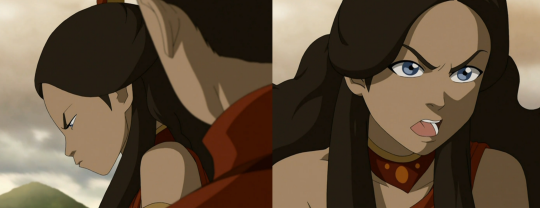
Her anger here doesn't highlight hot-headedness, it highlights compassion. Compassion is one of Katara's core traits. She's angry because she's being angrily demanded to see people suffer and stand by. And she will not tolerate it. She will never, ever turn her back on people who need her.
2. In reality, Katara is defined by her patience and compassion.
What I did here was listing off times where Katara did get angry. But Katara is generally a caring, kind person. Rather if it's cheering up Sokka, going shopping with him after he admitted to feeling useless; if it's pulling Aang out of the Avatar state, putting herself at risk when he's out of control; if it's helping deliver a baby of a stranger; or if it's freeing prisoners of the Fire Nation. She demonstrates impressive patience throughout the show.
The Deserter
In this episode Aang was asked to just control fire. Aang gets irrutated himself at this, but Katara assured him that it's probably for a good reaso. But when his master left, he firebent. He was being extremely careless with his new found Fire Bending and burned Katara's hands.
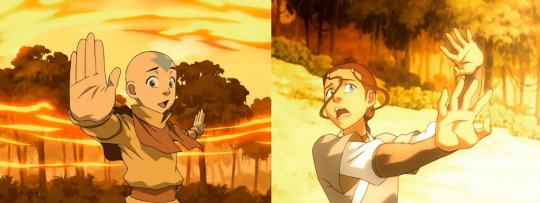
Did she...
A. splashed some water at him.
B. Yelled at him.
C. Ran away crying.
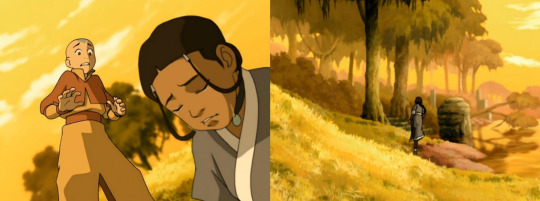
Yeah, she didn't express anger at all. Sokka was who's angry at Aang.
The Desert
The sand benders stole Appa and the Gaang is suck in a desert. Katara demonstrates her patience a lot this episode.
Toph and Aang are arguing about Toph not stopping them.
Aang: You just didn't care! You never liked Appa! You wanted him gone.
Katara: Aang, stop it. You know Toph did all she could. She saved our lives.
Sokka: Who's gonna save our lives now? We'll never make itout of here.
Aang: That's all any of you guys care about, yourselves. You don't care whether Appa is okay or not.
Katara: We're all concerned, but we can't afford to be fighting now.
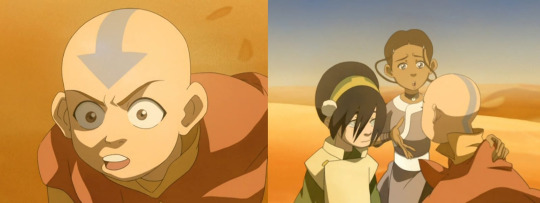
Aang accused the Gaang of something horrible. Katara told him to stop, but still understood his anger and calmly explained to him that it's important not to fight in a life threatening situation.
Aang then storms out to look for Appa. Katara's response?
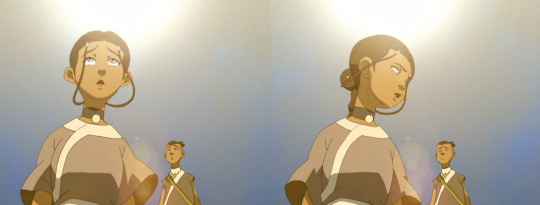
Katara: We'd better start walking. We're the only people who know about the solar eclipse. We have to get that information to Ba Sing Se.
She didn't get angry, she was rational and thought about the greater good.
After Aang comes back, Katara suggest they should try sleeping, gives the Gaang all of her bending water without drinking herself. And then finds a way to get to Ba Sing Se using the locations of star systems.
The Gaang spots a cloud and mistakes it for Appa. But Katara realizes the potential in a cloud. She tells Aang to fly and bend the water from the cloud so they could drink.
Katara (disappoibted): Wow, there's hardly any in here.
Aang (intensively): I'm sorry, okay? It's a desert cloud, I did all I could. What's anyone else doing? *Points at Katara* What are you doing?
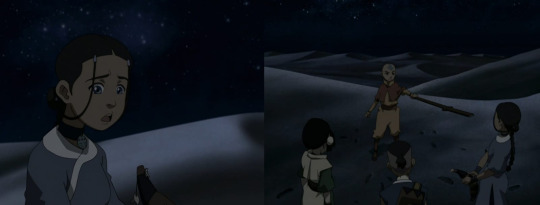
After dealing with everyone's tireness, Sokka's high nonsense and Aang's attitude, carrying everyone, thinking of possible solutions to ensure they'd all survive, how did she react to Aang accusing her of not doing enough?
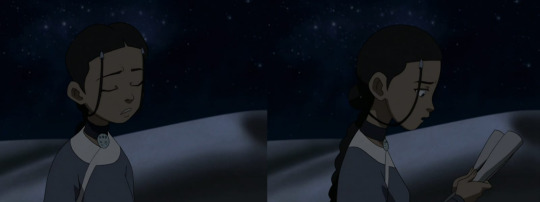
Katara: Trying to keep everyone together. Let's just get moving. We need to head this direction.
And after everything she did for everyone, she pulls Aang out of the Avatar state when he's raging, out of control.
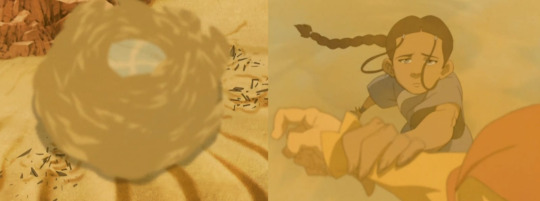
Katara is not so hot headed.
She's sweet, nurturing and caring. She demonstrated incredible patience and perhaps even saved the Gang's life in The Desert with her resilience. Katara's compassion is her defining trait.
But that doesn't mean she's not a human being – she's allowed to be flawed, and in the moments where she does, she's very remorseful. And in the moments where she doesn't, people will still hold her accoutable for simply feeling a justified emotion.
Does it make you oh-so-hot headed to stand up to a sexist denying her opportunity? To make sure your friends don't destroy your chances to win a war? To not tolerate being told to see people in need and do nothing in a middle if an argument she didn't start? Of course it doesn't.
And other characters are allowed to express anger, to be flawed, in ways that are way worse than Katara without being labelled annoying hot headed by the fandom.
Katara is widly known to be irrational, letting her anger get the better of her, but it's simply not true.
#katara of the southern water tribe#avatar katara#atla katara#katara defense#in defense of katara#meta#atla meta#katara meta#atla memes#atla#anti atla fandom#avatar the last airbender katara#avatar the last airbender#katara defense squad#katara deserved better#katara deserves better#the southern water tribe#southern water tribe#avatar the kast airbender meta#toph beifong#toph#long post#the painted lady#the chase#the runaway#the waterbending master#pakku#master pakku#katara and toph#katara my beloved
375 notes
·
View notes
Note
Would you say that the show itself doesn't respect/understand Katara's trauma?
Let's see:
The first voice we hear in the very begining of the show (not just in the first episode, but in EVERY SINGLE ONE that followed), is Katara's. The first character to explain the show's whole deal, HOPE, is her.
Right away she explains to us through narration the whole conflict of the story, and the series itself immediately shows us how it has affected her and her family personally, with the death of her mother, the departure of her father as he goes to fight in the war, her and her brother struggling to get food, the tribe having no defense.
She is the first person to interact with Aang, the protagonist - and we find out about HER life, HER trauma, and see a bit of HER personality before we even see Aang or find out his name. The show introduces us to KATARA as a character, while Aang and his backstory are still always a bit of mystery until episode 13. For fuck's sake, the reason Aang becomes so endearing so quickly is because he brings the fun of childhood back to Katara and HER village.
The idea of traveling to the Northern Water Tribe is introduced because KATARA wants to be a fighter. And even when it goes from a promise of adventure between two friends to an official mission, Aang is happy that they will learn TOGETHER. Hell, excluding the opening, Katara is the first character we see using any kind of bending on screen, in the actual story.
The death of Kya and how it has severely traumatized Katara is brought up three more times in the first season - when she's comforting Aang, and bonding with Jet and Haru.
The first situation is one of the many times the show will make clear parallel between Aang's anger/grief at what was done to his people and Katara's anger/grief at what was done to hers. She comforts him about Gyatso's death by mentioning the death of her mother, managing to make Aang come back for the Avatar state. In the start of season two, we hear her mention just how tough it is to watch someone she loves be in so much pain. She comforts him again when the Sandbenders take Appa. And then in the Southern Raiders, when Katara wants to murder her mother's killer, Aang EXPLICITLY recalls these moments to explain that he DOES understand what she's going through (same thing she said to him the very first time) and still thinks that this is not what she needs to heal - much like Katara telling him not to weaponize the Avatar State, aka his pain.
Katara's grief over her mother is explicitly shown as a reason why she wants to protect the innocent, to help anyone who needs her. In the Haru episode, she's explicitly shown as a figure that symbolizes hope in the darkest situations, just like Aang is too her. Once again, the show lets her have some time in the spotlight, even in a plot that could have easily been filled by Aang since the dude is basically a messiah. And in the Jet one, while she's being lied to, she IS trying to do something good - and Aang is there with her. Once again, Katara's hero journey, and all the grief that comes with it, is literally being written alongside Aang's.
The show also places great emphasis on her journey to become a poweful warrior, even openly challenging (and giving some trouble) to a master that is unfairly refusing to teach her solely because she is a girl. She gets to hold her own in a fight against Zuko in the season one finale. In season two, when she expresses the desire to be given the title of Sifu like Toph, Aang immediately accepts. Katara is constantly shown to be pretty badass - including in the Southern Raiders, where she looks the man that killed her mom straight in the face and says she's not a helpless little girl anymore, exposing one of, if not THE, main reason why she wanted to be a fighter so bad. To regain power, to protect herself and those she cared about.
And while the show DID highlight these moments of strength from Katara, it also let her be vulnerable. We see her crying after thinking she saw her mother in the swamp, and when she believes her friends see her more as a motherly figure than a kid because she was forced to grow up too fast after Kya's death - and then Toph comforts her because they DO see her as their friend, not just a replacement mom. There's also the beautiful scene of her and Hakoda, in which she is allowed to admit how badly it hurt to suddenly no longer have her dad around, even if it was necessary/for a good cause.
There's also little things like her being allowed to bond with Bato and reconnect a bit with her tribe's way of life after some time away from it, or the show explictly having her tell Hama that it would be an honor to be allowed to learn more about her culture and heritage, which the Fire Nation obviously has robbed her of as the tribe is struggling to just survive. She also is clearly overjoyed when Pakku says it's about time for the North to help rebuild the South.
And, of course, when she's face to face with the man that killed her mother, she is allowed to stay her compassionate self - while still not forgiving him because, surprise surprise, the writers knew what they were doing and did not want to force her to suddenly ignore all that trauma just to half-ass a lesson about forgiveness is ALWAYS the way to go.
Katara is allowed to be strong AND vulnerable. To help AND be helped by others. The show clearly demonstrates, repeatedly, that she isn't just struggling to deal with the death of a parent, but with having to sacrifice her own childhood, not having BOTH parents around, seeing her home be destroyed both literally and figuratively, the feeling of helplessness as this century old war is taking so much from her and others (both dear friends and strangers). The writting for her wasn't perfect, but it was clearly not an after-thought like part of the fandom claims.
Just because she didn't kill a guy and wasn't okay with using bloodbending unless 110% sure there was no other alternative, it does not mean the show didn't take her character and it's struggles seriously. And if this fandom cared about her half as much as they claim they do, they'd recognize that instead of complaining non-stop about how one of the kindest characters in the story didn't suddenly do a 180 turn and go "Murder is great actually"
102 notes
·
View notes
Text
Let’s talk about Katara.
Let’s talk about Katara, who had been born to a culture already decimated by the war and bloodshed and violence, who had been born the last waterbender of the Southern Water Tribe because the Fire Nation took them all.
Let’s talk about Katara, who had to watch her mother die to protect her, who had to watch her father leave with every man left in the tribe - and with him, many of those who were keeping the Southern Water Tribe’s cultures and traditions alive.
Let’s talk about Katara, who had to watch her own brother become obsessed with surviving and fighting, who pushed again and again and again to teach the younger children how to fight, until all that the tribe’s culture became is fighting and surviving.
Let’s talk about Katara, who had forgotten (and how everyone had forgotten) what it means to have fun until Aang arrives (“Don't you see? Aang's brought us something we haven't had in a long time: fun.”) because the war took that from her and her tribe and all they remember is how to fight and survive.
Let’s talk about Katara, who is the only one alive who could possibly understand what Aang has gone through, and how Aang is the only one who could understand what Katara has gone through. How they are both the last benders of their respective cultures, and how those cultures were destroyed by the imperialist Fire Nation. How they are holding on to every shred of their cultures in a world that continually rips that away from them.
Let’s talk about Katara, who lashed out in anger at Aang because he picked up waterbending so quickly (and it’s not fair, it’s not, it’s not, because she should’ve learned it growing up in the first place, but it was taken from her with every waterbender taken from the Southern Water Tribe) and she was the waterbender, what does it mean when she can’t even learn her own bending?
Let’s talk about Katara, who finally found a shred of her culture that wasn’t lost to the war, who sat in Bato’s tent that was built to resemble their home and joined in the ceremonial ice dodging as a rite of passage for Sokka - and how even then, it was tainted by the war (because Hakoda left when Sokka was supposed to do it and they didn’t dodge ice like they’re supposed to).
Let’s talk about Katara, who had traveled from the bottom of the world to the top in the hopes of learning waterbending - only to be told that no, you can’t learn because you’re a girl, who had to literally fight for her right to learning waterbending - her right to learning about her own culture.
Let’s talk about Katara, who learned that the necklace she and her mother and her grandmother wore was a betrothal necklace from the Northern Water Tribe - just another piece of her culture that didn’t truly belong to the Southern Water Tribe.
Let’s talk about Katara, who fought, and won, and could now learn waterbending alongside Aang, but all she is taught is the Northern style of waterbending. She will never learn the Southern style - the style native to her tribe, the style she should’ve learned (and yes, maybe it should be enough that she was even being taught, but war takes and takes and takes and you can’t help but grieve what was taken).
Let’s talk about Katara, who had been so eager to learn from Hama because she was the only other Southern waterbender, who had begged Hama to teach her their tribe’s culture, and all she was taught was use every resource at hand to survive and bloodbending - not even a shard of the Southern Water Tribe’s culture can survive without being tainted by war and bloodshed and violence.
Let’s talk about Katara, who looked Yon Rha in the eye - the man who killed her mother, the man who led the Southern Raiders in destroying every last piece of the Southern waterbenders’ culture - and chose to walk away instead (and maybe it’s because she’s strong enough to do it, maybe it’s because she’s too weak not to do it, but it’s more than he deserves).
Let’s talk about Katara, who looked Zuko in the eye and forgave him - Zuko, who had been part of the nation that instigated the destruction of her culture, who had been part of the royal family that commanded that destruction (and maybe she understands that it wasn’t his fault, not entirely, but maybe it’s also hard to see his face without remembering the ash and smoke and fire that consumed the Southern Water Tribe) - and that takes strength.
Because listen, listen. Katara is a character shaped by cultural genocide and loss and colonialism and assimilation. Her title as “The Last Waterbender of the Southern Water Tribe” defines her as much as how Aang's title as “The Last Airbender” defines him. Every choice she makes, every action she takes, has always been built upon loss - of her mother, of her culture, of her people.
Culture has always defined Katara so intimately, and by missing that, we miss who she is and who she’s meant to be.
#kataralove#atla katara#anti anti katara#katara meta#listen i have FEELINGS this morning#atla meta#northern speaks#time to see if any antis will clap back#sigh#this is an amalgamation of fic and essay im so sorry lollll#katara#assimilation#cultural genocide#colonialism#long post
1K notes
·
View notes
Text
on kataang and hope
its time for another ATLAnalysis woo
so I've watched ATLA maybe 4 or 5 times now? all at various points from when I was 6 to the present, and every time I pick up on more and more stuff, which leads to this little rant on Katara, Aang, and hope.
We all love to make fun of EIP, but this rewatch, something kinda stuck out to me.
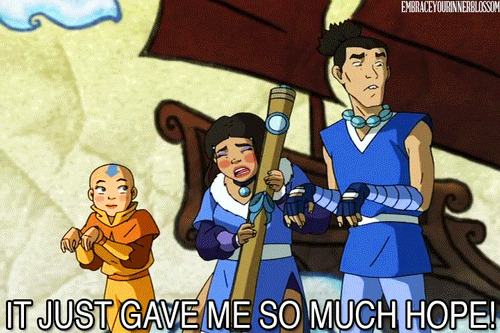
EIP Katara loves talking about hope, but hope really is such a central theme to Katara's character, just not exactly how they put it.
Throughout the series, Katara consistently gives EVERYONE hope, so so so much hope. The most obvious example of this is, of course, when she meets Haru and helps the earthbenders on the metal rig in season 1.
"Thank you for helping me find my courage, Katara of the Water Tribe. My family and everyone here owes you much."
She does this again reassuring Aang when the Gaang finds the forest burned down in Winter Solstice Part 1 (the episode where they meet Hei Bai).
"These acorns are everywhere, Aang. That means the forest will grow back! Every one of these will be a tall oak tree someday, and all the birds and animals that lived here will come back."
And again when they're in the desert after losing Appa and it looks like all is lost.
"Ugh ... We're getting out of this desert, and we're going to do it together! Aang, get up. Everybody, hold hands. We can do this. We have to."
And again as the Painted Lady for that fishing village.
"I shouldn't have acted like someone I wasn't, and I shouldn't have tricked you. But I felt like I had to do something. It doesn't matter if the Painted Lady is real or not. Because your problems are real, and this river is real. You can't wait around for someone to help you. You have to help yourself."
And again.

And again.

It's such a consistent and powerful theme with her and you can't help but admire the sheer determination and drive she has to spread the hope that she somehow retains in such a war-torn world, and this is what gets me!
Who gives her that hope?
Aang.
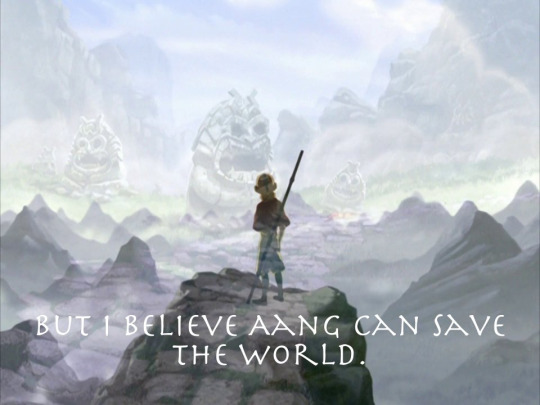
Even when he was still in that iceberg, Aang gave Katara hope.
Aang gives her the hope that yeah, the world can be saved and the war will be over.
Aang gives her the hope that she won't always have to be the responsible person, that she'll be able to let loose and have fun when this is all over.
Aang gives her the hope that as a survivor of genocide, she isn't alone, that she has people who love her and will help her rebuild.
Katara gives everyone else their hope, but Aang is the one to give Katara her own hope.
It's so powerful that these two genocide survivors (who, for all intents and purposes, are the only two in the world who understand their shared struggle) are able to help each other like this, to make the other believe in HOPE and GOOD THINGS after all their hardships.
It's such a core of their characterizations and relationship and just aaaaa how can anyone not love them for that?
#atla#atla rant#atla analysis#kataang#kataangtag#kataang meta#katara meta#atla meta#avatar the last airbender#aang x katara#katara x aang
211 notes
·
View notes
Text
I forgot to discuss this in my re-watch post but I also think that Katara’s water bending progress over Book 1 really shines in her fights with Zuko

Zuko notices right away that Katara has found a master.
I like how we see throughout Book 1 how Katara is making steady progress & using her bending to beat opponents more & more often (Jet, Zuko, Pakku) & all it takes is a few lessons from a true Master for her to become a Master herself.
Also - it’s interesting that Katara was 100% willing to leave Zuko for dead after she knocked him unconscious. Sokka even openly opposes bringing Zuko with them. It’s only Aang who has a problem with killing enemies, & he doesn’t seem to have processed the people who definitely died during the events of ‘Imprisoned’ & ‘The Northern Air Temple.’
I find Katara’s willingness to leave Zuko especially interesting because I think her compassion & kindness makes it easy to forget that she can also be quite brutal. She was the person to knock Zuko out so she would be responsible for his death if the gaang left him, & she was fine with that.
#katara#katara meta#ish?#Zuko#Aang#Sokka#atla#atla book 1#the siege of the north part 2#atla re watch
123 notes
·
View notes
Note
Would Katara still look at defeated Azula with compassion if the latter had managed to kill Aang in BSS?
She DID kill him, Aang just got better.
If Katara had not managed to bring him back to life though, I don't think she'd feel much, if any, compassion towards Azula - or Zuko, because she did NOT forget the role he played in the events of Ba Sing Se, as she so kindly reminded us by threatening to end him if he fucked up again.
But that is not to say she'd be happy about either of them being miserable either. Is like we saw in The Southern Raiders, and even when Zuko first joined the group - she is a very compassionate person with a strong sense of morals that make her hold some anger back, even against the people that hurt her the most, and she can forced herself to work with someone she despises for the greater good, but said anger still exists and is likely to never fade away because even Katara's compassion can only go so far.
So yeah, in that version of the story, she would not murder Zuko and/or Azula, but she is not becoming friends with Zuko or feeling sorry for Azula when seeing her breakdown.
7 notes
·
View notes
Note
Why did Katara spare Yon Rah?
Because Yon Rah wasn't worth it, she'd hurt herself as much as she'd hurt Yon Rah and generally murder is bad. The episode was quite clear about it.
Thanks for the ask ^^
#avatar the last airbender#atla#yon rah#katara#thanks for the ask ^^#Katara meta#the southern raiders
12 notes
·
View notes
Text
sometimes i think people forget what an absolutely radical choice it was for katara to reach out to zuko in the crossroads of destiny.
of course, as the audience, we want her to do so because we know what zuko’s been through and we know that this is the closest he’s ever come to switching sides, to finding redemption. but katara hasn’t been tuning in weekly to avatar: the last airbender. she has no idea that zuko’s just been through a metamorphosis, or that he freed appa, or helped an earth kingdom village, or even why he got his scar. she has absolutely none of the reasons that we have to feel sympathy for zuko and believe in his capacity for change… except that for a single moment, he turned to her in sympathy and sorrow, and said we are the same.
and for someone who has only the knowledge katara does of zuko at this point, that shouldn’t be enough! after all, one moment can’t possibly wipe out hunting her all over the world and fighting her and trying to capture her dear friend. but for katara, it is.
it’s enough for her to apologize, to listen, to offer him the most precious thing she has without a moment of hesitation. and that is compassion at its most absolute, purest form — to look at someone who has hurt you and still be willing and able to see the ways they too are hurting, to find even in the prince of the fire nation a grieving child like herself.
because that is the thesis of katara’s character, the heart of who she is: someone who cannot see others in pain without offering everything she has, hands open, to try and make it better. no matter what it costs her, no matter what she has to give, she will reach out again and again and again in love, in kindness, in empathy, because at her core she is a saviour and she will never, ever turn her back on the people who need her.
#katara#katara meta#zuko#in my loving katara hours today#it’s loving katara hours every day but today especially#she’s my baby girl
396 notes
·
View notes
Text
Katara being the last Southern waterbender
Does no one talk about how Katara must have been adored by her tribe? The first waterbender in years? That girl would have been spoiled. I imagine she would have been taught a lot of nearly forgotten culture and that Hakoda and Kya would praise her because she would be able to keep it alive.
But after Kya died, I can’t imagine Katara would want to try bending. Raids had happened in the past, but Katara would blame herself for Kya’s death and the deaths of anyone else. Bending would become something dangerous in her mind.
It’s something I’d like to think Hakoda and her tribe would have helped her with.
It may have been anger that helped Katara bend again. Anger at the Fire Nation for attacking them and for taking her mom and so many others away. And so she refuses to lose this as well.
Waterbending must be such a complex thing to Katara wherein it was supposed to be a blessing to her people and so she clings to it with desperation and stubbornness.
But also something she fears because her mother would have lived longer had she not been a bender.
Anyway I think there should be more exposure to Katara being adored and treasured for being the last Southern waterbender. I think her tribe should have tried stopping her from leaving with Aang. I think she’s someone who has to actively not be afraid whenever she waterbends and that this would have grown worse the more the Gaang saw the Fire Nation winning the war in the Earth Kingdom.
Also think it’s kind of frustrating Sokka got to talk when the Fire Nation attacked the North Pole, but we get nothing from Katara. It’s really not that difficult. I don’t understand why it looks like the show actively steered away from addressing her trauma so many times in canon.
179 notes
·
View notes
Text
What exactly were everyone's character arcs supposed to be?
This is an interesting question for ATLA, and one sometimes without a clear answer. Some characters have reasonably complete character arcs, and others simply don't, to a degree which is often not acknowledged today. A few are in-between. This not necessarily a function of screen time. Jet and Yue have reasonably complete character arcs despite only briefly appearing, while others with far more screen time do not.
Without further ado, I'll go through the characters one by one and try to give an answer:
Yue, as I said, has a story which feels complete with a beginning, middle, and end. She's a very duty bound person committed a political marriage to help her tribe, a person who was saved by the holy symbols of it in the first place. Then she falls in love with Sokka but refuses to break off her engagement out of duty. And finally she sacrifices her life out of duty to save everyone.
Jet also feels like he has an arc. You can take issue with how it was written and how it plays out, since he really got the short straw, but it's an arc. From being orphaned by the Iroh-aligned Rough Rhinos, to fighting the Fire Nation and going "too far," to trying to make a new start in Ba Sing Se, to correctly getting suspicious about Zuko and Iroh, to being brainwashed by the Dai Li, to dying fighting against Long Feng. It's not nearly as coherent as Yue's arc, but it's something.
Suki, by contrast, doesn't have much of an arc. I've heard before the concept of "character arc" being defined as "either the character changes or the audience's perception of them changes." Neither of those things ever happen with Suki. She remains unchanged, and we learn nothing really about her. The only meaningful character change which happens is that she and Sokka fall in love.
Aang quite obviously has an arc: grow into the position of Avatar, defeat the Firelord, befriend Zuko, and the end the war. And, of course, get together with Katara.
Zuko also has an arc, which the show probably spends more time on than with anyone else: change sides, become friends with the Gaang(although that bit was very poorly written), and reject his abusive father and instead start worshipping his uncle. And I suppose grow strong enough to beat the crap out of his sister, like he's always wanted to do.
Iroh, by contrast, couldn't have less of an arc. Any attempt to read an arc into the mess of extremely incoherent writing he was would require extreme charity. In the end, we're supposed to both accept he "changed" offscreen before the show(that his arc was already mostly complete?) but also that he was "always good" anyways.
Toph doesn't have an arc. 90% of her character development, such as it was, is confined to her first two appearances. After that, she's merely a hanger on to the Gaang. As much as people love her, there is so little to her story. Her character is better defined than Suki, but her story isn't.
Azula is supposed to have an arc. It's supposed to be about falling apart, going insane, and being lain low. But it was extremely rushed and shoved unconvincingly into the last few episodes, and the writers were uninterested in explaining what actually happened to make her fall apart, so I struggle to say she has anything resembling a coherent arc.
Ty Lee also doesn't have an arc. Her arc, such as it was imagined, was supposed to "betray Azula." Yet none of the character development she gets over the series leads in that direction, and we have every reason to believe she would have acted the same at the beginning of the series as she did at the end. And of course there was no "redemption" aside from switching sides for her.
Mai has slightly more of an arc than Ty Lee, but that's only because it involves her getting together with Zuko and eventually sacrificing herself to protect him. Otherwise, it's about as coherent as Ty Lee's arc.
Sokka's arc is an interesting one. I would say that there are four things they experiment with as the basis for his arc. First, there is his distrust for Aang, which is rapidly resolved. Second is his sexism, which is equally rapidly resolved. Third is unease over being a nonbender, but that's only rarely referenced over the course of the series, and is fully "resolved" in the truly awful episode "Sokka's Master" early in Book 3. Finally, there is the issue of his daddy issues and his desire to prove himself as a warrior. That is something his story keeps coming back to over and over again. However, it is almost entirely resolved in the Day of Black Sun episodes, where Sokka leads the SWT in battle, despite a couple weird later references in the Boiling Rock episodes. Thus, I would Sokka has an arc, but it's resolved well before the series ends.
Finally, we reach Katara. I don't think Katara really has much of a coherent arc in the series. In Book 1, it was all about her trying to become a master waterbender, but she achieves that by the end of the Book. After that, her character lacks clear direction. What's her story supposed to be about after that? Getting together with Aang? "Forgiving Zuko"? The daddy issues which show up for exactly one episode? The conflict with Toph which shows up for two? "Accepting that ordinary Fire Nation people are people too," even though she was always shown to be compassionate to ordinary Fire Nation people not actively engaged in genocide? The "mommy issues" which she often brings up but which are rarely taken seriously by the show, and are ultimately used to get her to forgive Zuko (two separate times!)? All of these seem completely unworthy of hanging her arc on, and I have to say, I don't think Katara has much of a coherent arc past Book 1.
If we had to order these characters in terms of coherence of arc from most to least, it would probably go something like: Aang, Zuko, Yue, Jet, Sokka, Katara, Azula, Mai, Ty Lee, Iroh, Toph, Suki.
#Katara#Zuko#Iroh#Aang#Azula#Mai#Ty Lee#Suki#Toph#Jet#Yue#Sokka#Katara meta#Zuko meta#Iroh meta#Aang meta#Azula meta#Mai meta#Ty Lee meta#Suki meta#Toph meta#Jet meta#Yue meta#Sokka meta#ATLA#ATLA meta
52 notes
·
View notes
Text
In Defense of Katara
Update: The views expressed on Aang in this post are majorly dated.
Katara has been..

a controversial character. Particularly for the following reasons.
Supposedly talking about her mother "all the time", bringing it up out of context, making it all about herself and lashing out about it.
But before properly analyzing her character, let's first actually list off all the episodes where Katara has mentioned her mother (also in video form):
The Boy in the Iceberg:
Mentions her mother to confront Sokka about being lazy, establishing the family dynamic after her death and generally setting up her character arc.
The Southern Air Temple:
Firstly mentions her mother to prepare Aang to discovering a "potential" loss when getting back home. Then again to show empathy to Aang by showing that she somewhat understands what he's feeling.
Imprisoned:
Brings up Kya to connect with Haru about similar losses. It's also brought up again by Haru when her mother's necklace disappears.
The Waterbending Scroll:
Didn't mention her mother, just the necklace. Since Zuko showed her the necklace, which was lost.
Jet:
Mentions Kya to connect with Jet who also lost his parents to the Fire Nation.
The Waterbending Master:
Once again, she only mentions the necklace. And only because Pakku notices it himself.
The Swamp:
The swamp makes her hallucinate about her mother. It was fully outside of her control.
The Crossroads of the Destiny:
Brings up her mother's death once she got a chance to have a conversation with Zuko, who was her enemy and for all she knew, represented the nation who killed her mother.
The Headband:
It is brought up by Aang. He tells Katara that people could recognize her necklace for being Water Tribe while hiding in the Fire Nation.
The Puppetmaster:
Katara connects with Hamma over being from Southern Water Tribe and being hurt by the Fire Nation.
The Southern Raiders:
This entire episode focuses on Kya. She mentions her 5 times total. (Worth noting that Zuko brought it up in the first place).
It is also brought up in The Runaway by Sokka, and in Sozin’s Comet Part 4: Avatar Aang by Hakoda.
To sum up: Katara brings up her mother in a total of 11 episodes. 1 to establish the tragedy, 1 to comfrot Aang, 1 was outside of her control, 1 to confront the Fire Nation prince, 3 to connect with someone with similar experience of loss, and 4 times it's just about the necklace.
The claim that Katara brings up her mother "all the time" and out of context is entirely baseless. But I know what you're thinking:
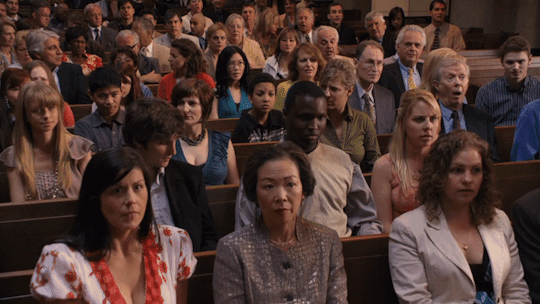
Yeah it's bad. Really bad. But Katara is a 14 year old, dealing with grief. By no means this is an okay thing to say. But let's dive deeper – how her mother's death effected her, the dynamics it created and if there is any truth to what she's saying.
Katara has always been the care giver, the one who'll notice when you're in need, giving seemingly unconditional emotional support. Even prioritizing other's well being over her own. In The Deserter, Aang acted careless, using his firebendering to accidentally injure Katara. Unsuprisigly, Aang feels terrible about hurting her. He is confronted about it not by Katara, but by Sokka. Meanwhile Katara heals her own scar. And in the end, she's the one comforting guilty Aang.
Another instance is The Desert. The Gaang was stuck without Appa, with little to no supplies, in the middle of a desert. They're all hungry, exhausted and unsure of what's to come. Katara shows incredible resilience and empathy – she offers her bending water to everyone, but isn't show to drink any herself. And her response to Aang's outburst after semi failinh to get water from a cloud.
Katara: Wow, there's hardly any in here..
Aang: I'm sorry, okay?! It's a desert cloud! I did all I could! What's anyone else doing?! *Points at Katara* What are you doing?
Katara: Trying to keep everyone together. Let's just get moving. We need to head this direction.
In the end of the episode, Aang finds the sendbenders who stole Appa. He gets in the Avatar state, and while all the other characters run away, Katara stays, she hugs him in an uncontrollable rage. Want to hear something interesting? We don't see the characters express gratitude to her efforts. Even in the next episode she helps strangers give birth.
Instead of resolving her trauma, Katara internalized it. She became "the mother". She is the reason Sokka doesn't bring up his mother. I'd like to add a quote from Sokka in The Runaway:
"I'm gonna tell you something crazy. I never told anyone this before, but honestly, I'm not sure I can remember what my mother looked like. It really seems like my whole life, Katara has been the one looking out for me. She's always been the one that's there".
This is the closest we got to giving Katara the much needed support. Their grief is not the same.
Same goes for Aang's grief. Yes, he lost his entire nation. While Katara's grief molded her character, Aang's grief is only brought up when used in context. It's only brought up explicitly 3 times: In The Southern Air Temple, while finding out what happened for the first time; in The Storm for giving us his backstory and in The Guru when he has focus on his grief. It's also used to create another layer of tension 3 other times (The Northen Air Temple, The Desert and The Serpent's Pass). In every time it's brought up, it's linked to the overall plot/subplot in some way. It isn't something that is shown to change who he is as a person.
Katara on the other hand, took on the mother role in the age of eight, fundamentally changing who she is. She is used to swallowing her pain, to suck it up because others need help. Only showing weekness when alone, when no one from the Gaang is looking.
Almost everything about her is somehow linked to Kya. She cooks, she she sews, she gives orders – like a mother. A quote from The Runaway:
Katara: What do you think, Aang? Do I act like a mom?
Aang: Well, I-
Katara (intensively): Stop rudding your eye and speak clearly when you talk.
Aang: Yes ma'am!
That's her canonical love intereat what? So casually, it's about Kya. The trauma they all experienced is semi the same, but the impact was completely different. Katara's experience of grief is fundamentally different from Sokka's and Aang's and never had a proper closure.
Until The Southern Raiders. Katara has a chance to finally express all of this pent up trauma. You might not think it's healthy, or sympathetic, but now it's Katara's grief that is on full display. But Aang and Sokka weren't understanding. They suggest her to go right back to what she has been doing for years. Aang even compares her loss to losing Appa and tells her she sound like Jet. And in a moment of humanity, weekness and frustration, Katara lashes out.
#oh my god#I'm done#also don't get me started on the fact that katara also feels guilty of her mother's death#because she died instead of her#okay that's it#I swear#katara deserved better#katara deserves better#katara defense#in defense of katara#anti kataang#katara of the southern water tribe#the southern raiders#water tribe#atla katara#atla#avatar#avatar the last airbender#avatar katara#Avatar the last airbender katara#katara#avatar aang#katara meta#katara analysis#media analysis#analysis#atla meta#avatar the last airbender meta#atla analysis#katara my beloved
97 notes
·
View notes
Note
Not a zutarian, but I don't think bloodbending is evil. It's not a pleasant sight and shouldn't be used lightly, but it is very useful in dangerous situations, so it is strange that Katara is never allowed to embrace that side of herself
The point is not "Bloodbending is never useful" or "Hama using it to escape the Fire Nation soldiers that captured her is as bad as her using it to torture innocent people." The point is "Katara is visibly uncomfortable with the implications of doing something that completely removes someone's agency/bodily automony, and being forced to do it was not empowering to her."
To make things clearer, lets says there's two people discussing the matter of owning/not owning a gun. Person A doesn't like guns and has zero intention to ever use one. Person B knows how to shoot and has a gun in their home to use in case they need to defend themselves from an intruder. They discuss the topic at length, and:
Scenario One: They eventually decide to just agree to disagree.
Scenario Two: Person A eventually decides, of their own free will, to buy a gun and learn how to use it, just in case they ever need to defend their family from an unexpected threat.
Scenario Three: person B leaves, then shows up again with two guns - their own and one they want person A to keep in their house - and constinues to insist person A has to learn to use it. Person A refuses, so person B threatens to shoot their family, and in a moment of panic person A takes the second gun and shoots person B in a desperate attempt to save their loved ones.
The third scenario is essentially what Hama did to Katara. Her student clearly stablished a boundary (not learning bloodbending - and even then Katara wasn't judging/afraid of Hama until she found out she had not used it solely in self-defense), and Hama went out of her way to not only ignore it, but to force Katara's hand.
This is not an empowering moment, this is not Katara's "dark side" showing, this is her desperately trying to survive and to save her friends. She had basically zero agency during that moment, hence her crying after the battle, something she never did after facing any other enemy during the show.
Once again, Katara looking freaked out after using bloodbending on the wrong person and then deciding to spare her mother's killer is her version of "Zuko considered burning Zhao during their Agni Kai, but in the end didn't go through with it." Is the character rejecting the option to be completely okay with inflicting all kinds of violence on people, without care, like it's nothing to them.
Bloodbending could never be a symbol of anything positive, or even neutral, about Katara as person because the very fundamentals of it go against everything Katara stands for.
74 notes
·
View notes